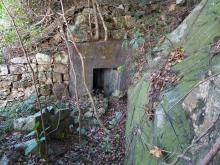9 Jan 1942, Chronology of Events Related to Stanley Civilian Internment Camp
Primary tabs
In the Kowloon YMCA the day Edith Hamson has been longing for finally arrives:
Four excruciatingly long weeks passed and nothing happened to change our situation. There was no more fighting, no more bombing. We remained cooped inside the YMCA in crowded quarters with no news of the outside world....
The morning of 9 January began as just another miserable day. Then, without warning, we were ordered to congregate in the foyer.
They are taken to the Kowloon Hotel. As she struggles up the stairs to the second floor, she sees her husband Arthur standing at the top of the landing:
I forgot about the soldiers guarding us, I forgot about everything and started running up as he came towards me. The children followed me, and the four of us held each other, kissing and hugging...
The soldier screamed at us in Japanese, pointing skywards and pushing Arthur back up the stairs. Our reunion had lasted for less than a minute, then my husband was gone.
Captain Tanaka, at the time Japanese head of communications, gives permission to Thomas Edgar and other bakers to start making bread for the hospitals. They open the Chinese-owned Green Dragon (Ching Loong) Bakery in Wanchai. ((See note.))
Sources:
Tanaka: article by E. (mistake for T. H.) Edgar, The British Baker, September 13, 1946, pages 18-19
Hamsons: Allana Corbin, Prisoners Of The East, 2002, 115-117
Note:
Barbara Anslow's diary establishes that bread began to reach the hotels on January 12 and John Luff, basing himself on the diary of Captain A. Potts, states that 'the local Red Cross sent in sufficient bread (to the Nam King Hotel) to provide each person with one slice a day'. Neither of the two extant accounts by the bakers mentions sending bread to the hotels, but it seems likely that the Ching Loong was indeed the source of the bread that went in.
Source: John Luff, The Hidden Years, 1967, 166

